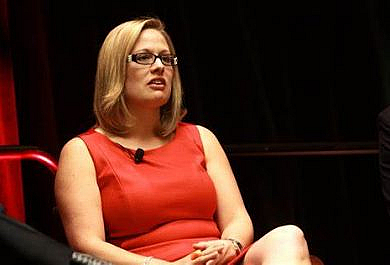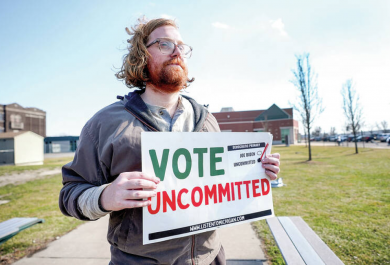Florida Gov. Ron DeSantis suspended his once-promising presidential campaign on Sunday after a disappointing finish in the Iowa Caucus.
Summary
Florida Gov. Ron DeSantis suspended his once-promising presidential campaign on Sunday after a disappointing finish in the Iowa Caucus. DeSantis began 2023 tied with former President Donald Trump in polls of GOP primary voters, but proved unable to seal the deal with voters after Trump’s indictments and his own stumbles.
- “It’s clear to me that a majority of Republican primary voters want to give Donald Trump another chance,” DeSantis said in a brief video message announcing his withdrawal. He ended the video with a perfunctory endorsement of Trump and one last jab at the woman who surpassed him as Trump’s main foe.
- “I signed a pledge to support the Republican nominee and I will honor that pledge,” DeSantis said. “He has my endorsement because we can’t go back to the old Republican guard of yesteryear, a repackaged form of warmed-over corporatism that Nikki Haley represents.”
- Trump dropped the nasty personal attacks he’s leveled at DeSantis for months as soon as he withdrew from the race. After DeSantis endorsed Trump, the former president pivoted 180 degrees to praise DeSantis as “very gracious” and “a really terrific person.”
- DeSantis ended his campaign two days before the New Hampshire primary, where Trump is favored to prevail over his chief challenger, former UN Ambassador Nikki Haley. Trump leads Haley by 17.5 points in the RealClearPolitics polling average.
- DeSantis trailed Haley by 30-points before he dropped out, and it’s not clear whether his few remaining supporters will follow his lead and back Trump or support Haley, his main opponent.
![]()
- The New York Times’ Nate Cohn looked back at “the lost DeSantis moment.” “But rather than dwell on his losing campaign, it’s worth returning to his apparent strength at the outset — that brief moment when Mr. DeSantis, or at least the idea of Mr. DeSantis, routinely led Mr. Trump in high-quality head-to-head polls,” Cohn wrote. “In the eight years since Donald J. Trump won the Republican nomination, this was the only moment when Republican voters appeared willing to go a different direction. Mr. DeSantis didn’t capitalize on the moment, but nonetheless it’s the only glimpse we’ve had into the post-Trump Republican Party.”
- CNN’s Ronald Brownstein assessed “the real impact of DeSantis’ decision to quit”: “his endorsement of Trump – whom he had criticized with growing ferocity in the past few weeks – may reinforce the signal that almost all of the GOP leadership wants to wrap up the race so the party can focus on the general election against President Joe Biden.”
- The Washington Post’s Dan Balz asked if, after DeSantis’ withdrawal, this means “the notion of a competitive Republican primary” was “just a mirage?” “For Democrats, a swift end to the Republican contest is what they claim they want, forcing voters to recognize that their choice in November will be between the president and the former president, a contrast they argue plays to Biden’s advantage,” Balz concludes. However, “There will be nervousness among Republicans, as well, for they are showing they prefer to cast their lot with the man who both lost the last general election and faces a spring and summer sitting in a courtroom.”
![]()
- The New York Post’s Isaac Shorr argued DeSantis’ decision to endorse Trump “proves he didn’t have what it takes to beat the former president.” Shorr called DeSantis’ voluntary decision to endorse the man who has smeared him for months “by far the worst moment of his political career” and an indication that he “lacked the conviction that would have been necessary to prevail against Trump.”
- The Federalist’s Emily Jashinsky argued “no, there was nothing DeSantis could have done to beat Trump.” She concluded, “We’ll never know whether DeSantis would have won the nomination if the GOP field didn’t include the former president. To the extent his failure reflects on the political future of post-Trump Republican politics, it’s a lesson that Trump himself remains the most important part of that equation for GOP voters because he’s the primary target of their enemies. Ron DeSantis first catapulted to success because he understood that. It can take him to new heights again.”
- The Editors of National Review called the DeSantis campaign “a good idea that failed.” Aside from events outside of his control and his campaign’s “serial mistakes,” the editors pointed to another contributing factor in his defeat: “ DeSantis is at bottom a conviction politician, but he seemed overly calculating. His criticisms of Trump were highly modulated as he clearly worried about saying the wrong thing, while Trump heedlessly attacked, mocked, and lied about DeSanctimonious. As governor, he had a big pragmatic streak that was nowhere to be found on the campaign trail. He was also lacking as a performer.”
© Dominic Moore, 2023






